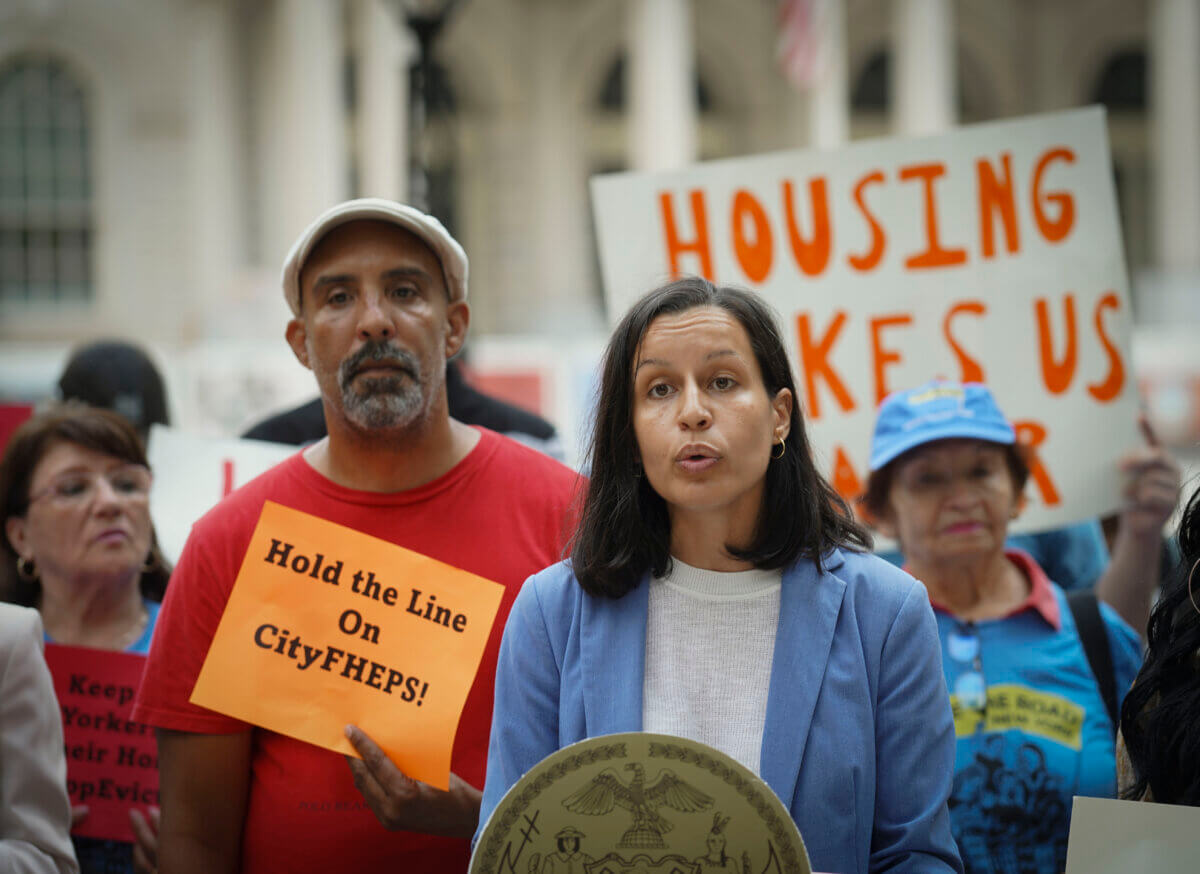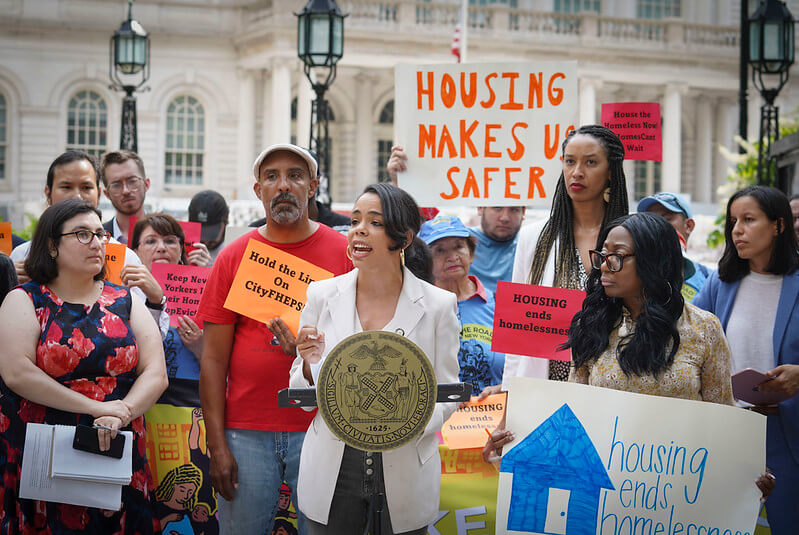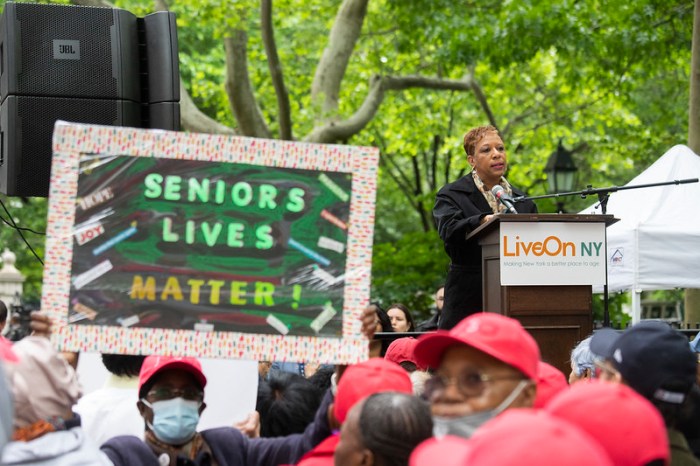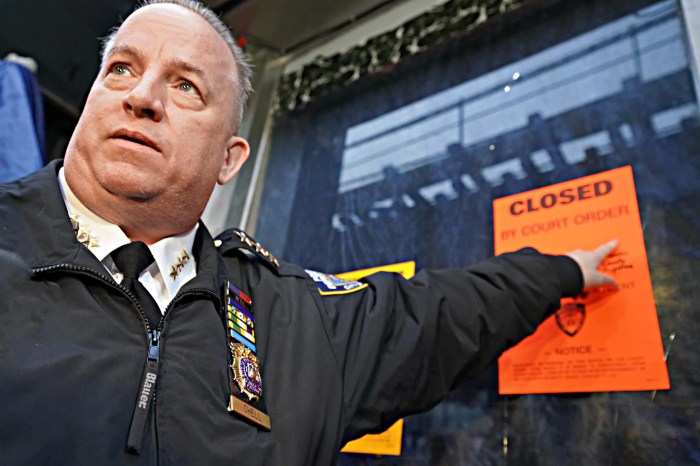The City Council on Thursday voted to override Mayor Eric Adams’ veto of several bills aimed at broadening access to rental assistance vouchers, in what has become one of the fiercest battles at City Hall.
With a 42 to 8 vote margin, the council pushed through the four bill package over the mayor’s formal rejection of the measures. Mayor Adams vetoed all four pieces of legislation last month after the council passed each one by a 41 to 7 majority in late May.
But the veto-override may not be the end of the saga, with the mayor and administration officials in recent days outlining the contours of a legal challenge against the council to block the bills. That potential legal case against the legislation is based on the premise that administering rental assistance programs is outside of the council’s “legal authority.”
In a statement following the vote, the mayor said his office is “reviewing our options and next steps.”
While casting her vote to override, City Council Speaker Adrienne Adams said having to reverse the mayor’s veto is “incomprehensible to me” as she thanked Deputy Speaker Diana Ayala, who has experienced homelessness, for helping craft the legislation.
“This is a personal matter for many of us,” the speaker said. “The fact that we have to override a veto is incomprehensible to me. Deputy Speaker Ayala, I want to say thank you for always sharing your personal experience of living in shelter, of being a part of the population that we in this council are fighting with every fiber of our being to help in this moment.”
While voting in favor of the measures, Bronx Council Member Pierina Sanchez (D) dedicated her vote to all those who’ve come into her district office desperately seeking housing assistance.
“For everyone who has come into the office in tears asking me for help, this is for you,” Sanchez said with tears in her eyes.
The speaker said the mayor so far had not spoken to her about the possibility of his office bringing a suit against the council to block the bills.
“It’s a conversation that has yet to be had with us,” she said. “I think it’s a little presumptuous for me to answer when there’s been no conversation around that situation with me personally.”
What the legislation means
The package includes measures geared towards dramatically increasing the swath of people eligible for a city rental subsidy program — known as CityFHEPS.
The bills would nix the rule that people must live 90 days in a homeless shelter to be eligible for a voucher, expand access to anyone on the verge of eviction, eliminate an applicant’s source of income or employment status as criteria for obtaining the subsidy and shift the income requirement from 200% of the federal poverty level to 50% of the Area Median Income (AMI).
The council has pushed the legislation as a way to get more people out of homeless shelters and into permanent housing, as the city now has over 100,000 people in its shelters — more than half of whom are migrants who arrived here since last spring, according to City Hall.
“As we welcome new migrants in our city, we have to make space within our institutions,” said Sanchez, who sponsored two bills in the package, during a press conference before the vote. “The council’s legislation represents comprehensive solutions to help people to stay in their homes and help to move families quicker through the shelter system and into permanent housing.”
City Council Member Tiffany Cabán (D-Queens), who also backed one of the bills, blasted the administration’s efforts to paint the legislation as too expensive.
“What we are pushing through today is a common sense, cost-efficient, legislative package that will move struggling New Yorkers from the shelter system into permanent housing much more efficiently,” Cabán said. “And any claims that it is fiscally prudent or logistically impractical or at best flavor errors, and at worst outright bias.”

Crunching the numbers
Instead of signing the bills, Mayor Adams dropped the so-called “90 day rule” himself last month, signaling that it was the only part of the package he supported. The mayor has made his opposition to the bills quite public, arguing they would cost the city over $17 billion over the next five years, while the increased number of voucher holders would create more competition for a limited supply of available apartments.
“Unlike the council, we do not, however, believe that New Yorkers should spend $17 billion on a package of bills that would put New Yorkers in shelter at the back of the line for a CityFHEPS voucher and make it harder for them to find permanent housing,” the mayor said in his statement.
The Citizens Budget Commission, a fiscal watchdog, argued in a Thursday tweet thread that the bills wouldn’t reduce spending overall, even though the monthly cost of a voucher is lower than that of a shelter stay. That’s because vouchers are long-term commitments, they said, while shelter stays are shorter.
The commission also noted that the Fiscal Year 2024 Budget just adopted by the council includes less funding for the program than last year’s: $280 million for FY24 compared to $421 million for FY23.
The council disputes both claims, arguing its own analysis shows the measures would actually cost $10 billion over the next five years and that expanded voucher eligibility would not create increased competition because more people would be kept in homes instead of entering shelters. The homeless shelter provider Win estimates expanding the vouchers will actually save the city $730 million per year on shelter costs, and the Community Service Society predicts it will lead to $600 million in yearly savings.
Christine Quinn, president and CEO of the nonprofit Win and a former City Council speaker, said there’s a clear difference between her organization’s analysis and that of the Citizens Budget Commission.
The commission, she said, just looks at how much is being spent on a voucher and not how much is being saved by preventing people from being evicted.
“Giving somebody a voucher when they’re facing eviction isn’t just spending money, it’s saving money, because then they’re not going to end up evicted and end up in a shelter,” Quinn said. “So the Citizens Budget Commission just acts as if one thing is the only thing that happens and that there aren’t a set of reactions that occur.”
Read more: St Veronica’s Church Prepares for Final Mass




































